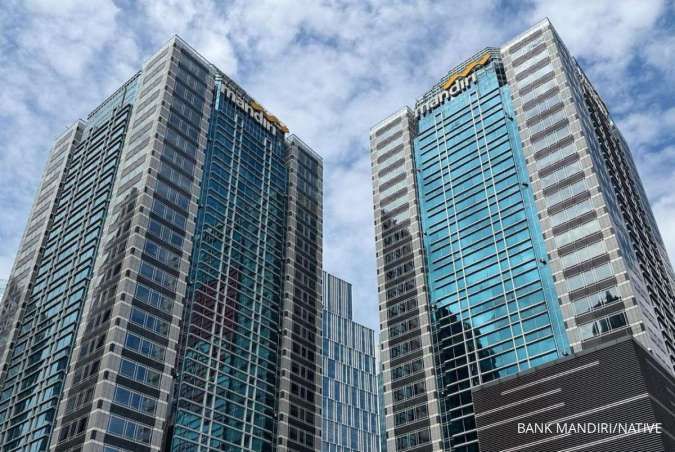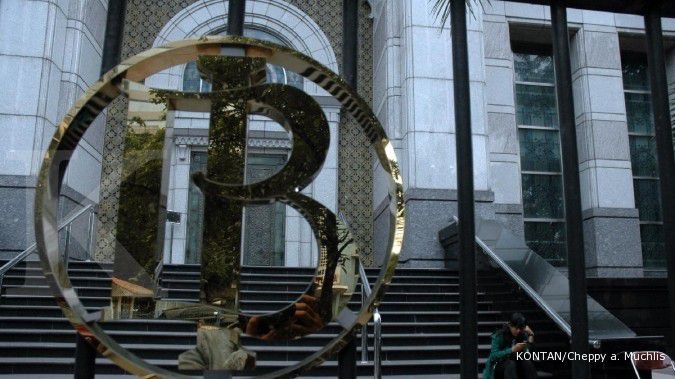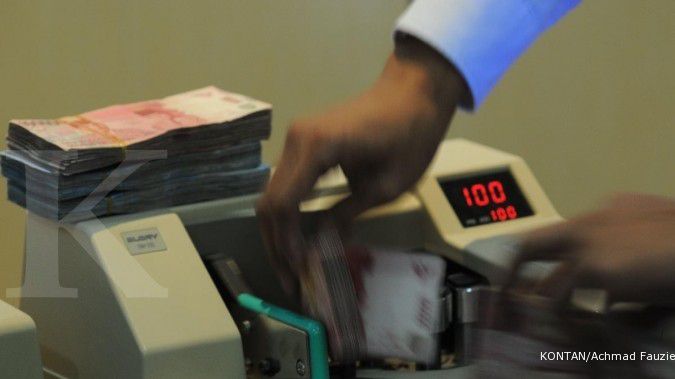JAKARTA. Indonesia, a consumption-driven economy, may see another downturn in economic growth after Bank Indonesia (BI) started a liquidity tightening campaign on Thursday by raising its key interest rate to contain inflation and stabilize the rupiah.The central bank’s decision to push up the interest rate would help halt the fall in the rupiah, which has been under pressure amid the withdrawal of foreign funds from the bond and equity markets in the last several days.Bank of America Merrill Lynch economist, Hak Bin Chua said on Thursday the higher interest rate would prevent the rupiah from further fall.However, the liquidity tightening would hurt investment and domestic demand, which would in turn affect economic growth, Chua added.BI Deputy Governor Perry Warjiyo acknowledged the new policy rate would drag down the GDP growth. “Following the hike, the tendency will be for our full-year economic growth to head toward 6.1 percent,” Perry told reporters after the central bank’s monthly board of governors meeting.The government proposes to revise down its growth target to 6.3 percent, from 6.8 percent in the 2013 State Budget.The central bank has recently been under pressure to increase the interest rate to help contain inflation and reverse the weakening trend of the rupiah. BI has estimated that annual inflation might top as high as 7.8 percent this year — well above its target of 5.5 percent — while earlier this week the rupiah weakened below its psychological level of 10,000 per US dollar. Despite the increase in the interest rate, rupiah fell 0.3 percent to 9,887 on Thursday, prices from local banks compiled by BI in the Jakarta Interbank Spot Dollar Rate (JISDOR) show.Representatives from the business community said that the decision by BI’s newly appointed Governor Agus Martowardojo to raise the key interest rate signaled a possible end of the low interest rates regime championed by former central bank governor Darmin Nasution.“Banks will soon adjust to the policy by increasing their credit interest rate, and this will affect our business by creating additional costs,” said Sofjan Wanandi, the chairman of the Indonesian Employers’ Association (Apindo).Credit Suisse economist Robert Prior-Wandesforde argued that the move signaled that BI, under Agus’s leadership, might be shifting gears into hawkish, a term coined for a central bank prioritizing stability rather than economic growth.“The big question [...] is whether the same actions would have been taken by the previous BI Governor,” he wrote in a research note.Meanwhile, Finance Minister Chatib Basri shared a different view, saying that 25 basis points of BI rate hike “will not affect much” of the economic expansion. In contrast, it would help contain inflationary pressure, eventually leading to stronger household consumption, he said.Chatib recently acknowledged that the 6.3 percent growth target would need “extra efforts” to achieve, citing the fact that Indonesia expanded only by 6 percent in the first quarter this year, its slowest pace in two years.He predicted that the market “will respond positively” to the BI rate hike. “A fair increase in interest rate will not significantly lower our investments – in fact, it is good to instill confidence so that the foreign direct investments keep flowing in,” the minister wrote in a text message on Thursday.The Jakarta Composite Index fell by 1.92 percent on Thursday to close at 4,607.66, erasing the previous day’s increase to end at the lowest level since February. The index has lost 11.6 percent since its highest level on May 20. (Satria Sambijantoro and Linda Yulisman/The Jakarta Post)
New rate will hurt economy
JAKARTA. Indonesia, a consumption-driven economy, may see another downturn in economic growth after Bank Indonesia (BI) started a liquidity tightening campaign on Thursday by raising its key interest rate to contain inflation and stabilize the rupiah.The central bank’s decision to push up the interest rate would help halt the fall in the rupiah, which has been under pressure amid the withdrawal of foreign funds from the bond and equity markets in the last several days.Bank of America Merrill Lynch economist, Hak Bin Chua said on Thursday the higher interest rate would prevent the rupiah from further fall.However, the liquidity tightening would hurt investment and domestic demand, which would in turn affect economic growth, Chua added.BI Deputy Governor Perry Warjiyo acknowledged the new policy rate would drag down the GDP growth. “Following the hike, the tendency will be for our full-year economic growth to head toward 6.1 percent,” Perry told reporters after the central bank’s monthly board of governors meeting.The government proposes to revise down its growth target to 6.3 percent, from 6.8 percent in the 2013 State Budget.The central bank has recently been under pressure to increase the interest rate to help contain inflation and reverse the weakening trend of the rupiah. BI has estimated that annual inflation might top as high as 7.8 percent this year — well above its target of 5.5 percent — while earlier this week the rupiah weakened below its psychological level of 10,000 per US dollar. Despite the increase in the interest rate, rupiah fell 0.3 percent to 9,887 on Thursday, prices from local banks compiled by BI in the Jakarta Interbank Spot Dollar Rate (JISDOR) show.Representatives from the business community said that the decision by BI’s newly appointed Governor Agus Martowardojo to raise the key interest rate signaled a possible end of the low interest rates regime championed by former central bank governor Darmin Nasution.“Banks will soon adjust to the policy by increasing their credit interest rate, and this will affect our business by creating additional costs,” said Sofjan Wanandi, the chairman of the Indonesian Employers’ Association (Apindo).Credit Suisse economist Robert Prior-Wandesforde argued that the move signaled that BI, under Agus’s leadership, might be shifting gears into hawkish, a term coined for a central bank prioritizing stability rather than economic growth.“The big question [...] is whether the same actions would have been taken by the previous BI Governor,” he wrote in a research note.Meanwhile, Finance Minister Chatib Basri shared a different view, saying that 25 basis points of BI rate hike “will not affect much” of the economic expansion. In contrast, it would help contain inflationary pressure, eventually leading to stronger household consumption, he said.Chatib recently acknowledged that the 6.3 percent growth target would need “extra efforts” to achieve, citing the fact that Indonesia expanded only by 6 percent in the first quarter this year, its slowest pace in two years.He predicted that the market “will respond positively” to the BI rate hike. “A fair increase in interest rate will not significantly lower our investments – in fact, it is good to instill confidence so that the foreign direct investments keep flowing in,” the minister wrote in a text message on Thursday.The Jakarta Composite Index fell by 1.92 percent on Thursday to close at 4,607.66, erasing the previous day’s increase to end at the lowest level since February. The index has lost 11.6 percent since its highest level on May 20. (Satria Sambijantoro and Linda Yulisman/The Jakarta Post)





